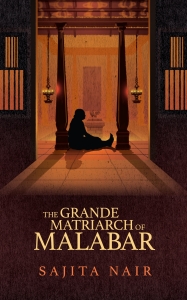
1.
It happened about a year ago in late July, when torrential monsoons swept the Malabar Coast. Deafening rolls of thunder rumbled above. Coconut and areca palms
swooned in swirling winds and rains. Streams, rivers, and wells swelled. Raindrops plopped on rooftops, muddy puddles and black umbrellas.
Dakshayani Amma loved the rains and, in a way, it was peaceful that she exited thus. But it was a poignant moment. Her stooping form, in a white mundu-neriyathu and blouse floated shrimp-like, on the water. They wrenched her out from the well on the eastern wing, near the kitchen. Her emaciated, stooping form belied the powerful woman she once was, the matriarch who had it all, acres of estate, power, and a noble lineage. She died rich, but in some strange way, far poorer than anyone around.
Curious onlookers gathered and police arrived. Dramatically, dark clouds gave way to golden streams of sunshine, twinkling through the fronds and casting shadows
of the scalloped Mangalore tiles.
A lanky policeman pulled out a pen from his chest pocket and curled up his thick black moustache, before he began taking notes on his notepad. Another policeman clicked pictures, carefully adjusting the lens of his camera. They scrutinized her drenched body. There was a gash on her forehead, shaped like the tip of a dagger. The senior among the three policemen, a short, stocky man with his khaki uniform shirt stretching tautly across his midriff, talked on his mobile phone. Behind him, someone whispered, ‘Is it suicide or. . .murder?’
The stocky policeman hung up hastily, twirled around on his booted heel and began interrogation. ‘How old was she?’
‘Eighty-six,’ said her younger son, respectfully unfolding the lungi from his waist.
The policeman looked around, as policemen do, his lips puckered between hirsute fingers and eyes oozing suspicion. He peered at the pale blue wall, which had black and white photographs slanting forward. They were yellowed with time and their scalloped borders devoured by termites had stained sepia. The black grandfather clock on the wall was tilted, its dials frozen at six-thirty.
There was a time when Dakshayani Amma was constantly aware of its ticking and from anywhere, her eyes darted urgently to this clock. There were umpteen chores
and responsibilities—members to be attended to, workers to be instructed and overseen, an army of servants to be supervised with cleaning of the interiors and premises, all in a bid to maintain the reputation and nobility of the Kalyedath lineage to evince people’s reverence.
The policeman, out of what seemed like a compulsion, straightened the awry clock and nodded in satisfaction.
‘At least, keep it running,’ he said. ‘It is bad omen to have dead clocks in the house. Anyway, where do you live?’ his eyebrows shot up.
‘Nearby,’ the son said. ‘Beyond the family pond. Just a few hundred metres from here.’
‘Who was she living with?’
‘She lived alone,’ the elder son said.
‘Hmm...’ the policeman swung his baton nonchalantly into the sultry air. ‘How many children does she. . . I mean, did she have?’
‘Five, but. . .’
‘And still she lived alone?’ he intervened with a smirk.
‘What has the world come to?’ He cast an accusing glance at the sons, who stood grim faced avoiding the policeman’s despicable stare.
The conceited policeman then marched forward, digging his heels on the cemented, red oxide floor, worn bare in patches. His dark eyes scrutinized the wood-panelled ceiling and verandas along the rectangular, sunlit, central courtyard of the ancestral mansion. ‘This looks like a naalukettu ,’ he said, tapping his baton on the carved teak pillars and heavy wooden doors. ‘How old is this house?’ he then turned to the son and distractedly peered out of the window to the terraced highland on the southern side, which was a thicket of coconut palms, jackfruit trees and untended banana
plantation.
‘About two-hundred years old, from what I have heard,’ said the elder son. ‘This is the Kalyedath tharavad.’
‘Hmm,’ the policeman nodded as he bent his torso to get past the short door frame into a room. ‘So, this was her room?’
The elder son, who led him in, nodded. The room had low, wooden ceiling and perpendicular, wooden window grilles. Cobwebs hung from above like cottony, black
chandeliers and moss covered the unused ledges and slats of the window. A lone brass lamp in the corner had turned entirely green with patina.
‘That was her bed,’ the elder son said, pointing to the high bed, which had a stained mundu as bedspread.
The sudden rush of musty odour caused the policeman to sneeze a couple of times, but he composed himself and patted his nose with the middle of his palm. He then leant on the high bed frame and ran his baton over the ornate wooden embellishments on its headrest, causing a dull, rolling hum to emanate. ‘Open this,’ he said, pointing to a small teak chest with pyramidal lid placed at the corner.
As it was opened, he jabbed the contents with his baton cautiously, as though expecting a bomb to explode. He flicked the mundu and blouses, which were clean but unfolded. A colourful Malayalam magazine wedged among them caught his attention. As he picked it up and turned its pages, a photograph of a little girl fell to the floor.
‘That’s her granddaughter,’ said the elder son, picking it up. ‘This was when she was three years. . .’ The policeman’s flinty eyes stopped him mid-sentence.
The policeman then swaggered towards the eastern wing. The grindstone slab, with a depression at its belly caused by years of grinding roasted coconut, cumin, coriander and chillies, sat eerily still. Neither ants buzzed around it, nor did millipedes assemble under its once moist base.
The investigation continued. Three policemen trotted intently into the many rooms on the ground and first floors around the central rectangular courtyard, their trained eyes hungry for hidden clues. They asked to open the strong room, the pathayam and even searched behind the photo frames of Lord Krishna and Lord Ayyappan. They glowered at the three sons, their wives and teenage sons, intermittently interrogating and puncturing the solemn air with their authority. Their batons pointed to various nooks and alcoves, followed by a barrage of questions.
Then they marched to the forested family shrine, along a narrow path. Mud tracks on which the forty-two members of the family trotted back and forth either to pay obeisance at the sacred grove, the kavu , or to catch a bus from the main road a kilometre away, had become unrecognizable with overgrown weeds. The policemen waved their batons effectively to rid the foliage in their path.
‘This is our sarpa-kavu ,’ said the elder son, as the policemen descended the rock-cut steps to enter the premises. ‘We follow the tradition of not entering the premises with footwear or western trousers.’
The policemen gawked at him in unison. The senior opened his mouth to say something but refrained. They stepped back.
Back at the foyer, they picked up their peak caps and wore them, a sudden expression of preoccupation creeping in on their faces. ‘Come to the Vemkavu police station for the formalities,’ said the one who had been taking notes. ‘By the way, who is the legal heir of this property?’
‘Our niece, who is in Boston. Sister passed away last year.’
‘Have you informed her?’
‘Yes, but she cannot come.’
The policemen headed back to the jeep with brisk, purposeful steps. ‘Vemkavu is seeing many such cases these days,’ the senior policeman said as he got into the jeep. ‘Difficult to say whether it was a suicide. There was no note, nothing to substantiate that she had prepared for it. The wooden chest and her bed were unkempt and looked as though it had been left in a hurry. There was a semi-dry,
crumpled bath towel on one side of the headrest.’
‘I have my doubts too,’ said the lanky one who had been taking notes. ‘Could it be a thief, who unintentionally committed a murder? Didn’t the family members say that some brass vessels and lamps were missing?’
‘I have seen many cases of relatives hatching plans to get rid of the older members,’ said the senior one. ‘It is usually to do with estates and property. And they have plenty. But in this case, that doesn’t look like a motive since the property has been bequeathed to her granddaughter.’
On the mud road flanked by mussaendas, hibiscus, red pagoda flowers and ixoras, the jeep rolled off with the policemen holding the grab handle, one leg on the footrest
outside, ready for action. In their wake, they left splashes of slush on the bright yellow variegated leaves of the tropical crotons.
‘The death of another old tharavad,’ the senior policeman lamented. ‘Now, in its place will come a glitzy new construction or some towering dwelling in flashy fluorescent colours. A lanky-armed JCB will slice through everything—boulders, cement, wood, walls and stories. . . .’
Soon after Dakshayani Amma’s passing, land dealers began hovering around Kalyedath, like vultures eyeing their next prey. Their overzealous comments on razing the mansion to the ground made old timers nostalgic. ‘You must not do that,’ one of the old women said, her speech garbled by her hollow, sunken cheeks.
‘Dakshayani Amma wouldn’t like it.’
‘She is dead,’ the brokers sniggered, waving away the wrinkly, senile woman.
The old woman laughed hysterically, her stooping, emaciated torso shaking. ‘But you can’t sell it,’ she pointed a frail finger to the foyer of the old mansion. ‘Can’t you see that she still lives there?’
About the Author







Comments